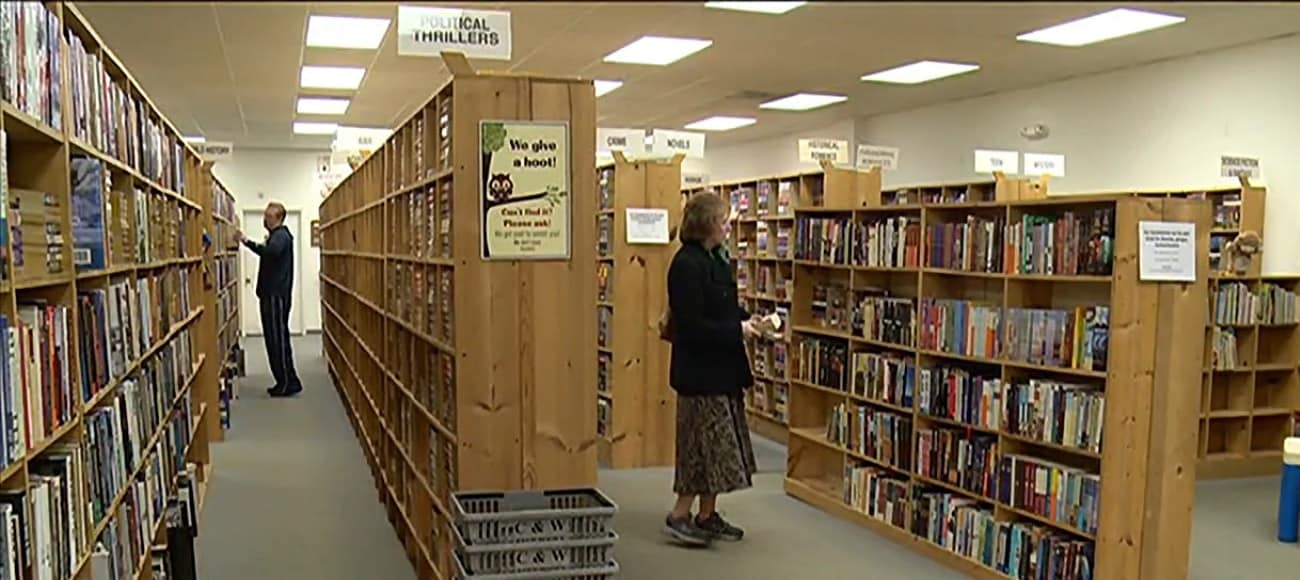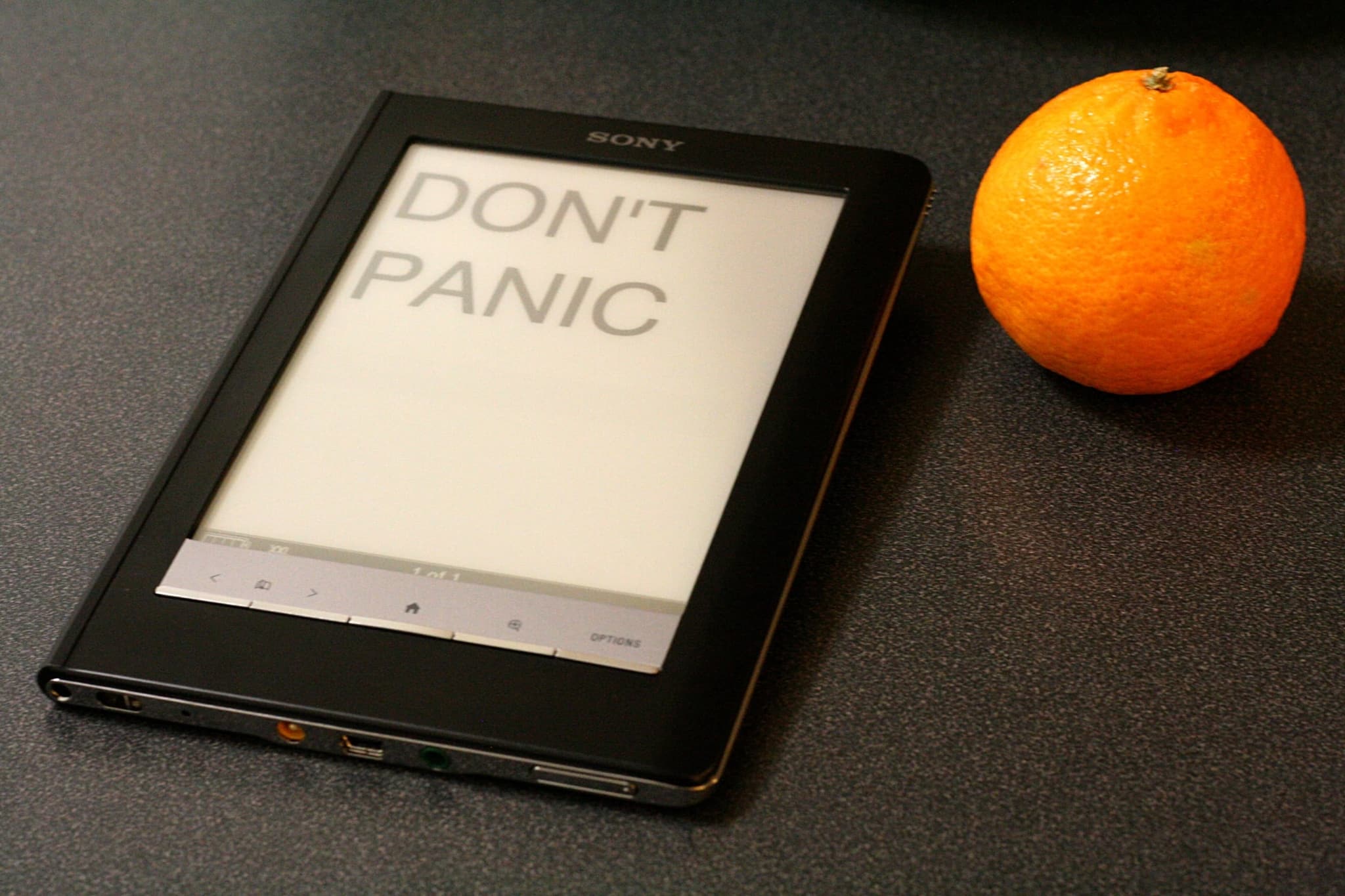My Local Used Book Shop is Closing: a Cautionary Tale

 On Monday, 29 February, my local used book shop will be closing for the final time. C&W Used Books has been in the same Woodbridge location near Potomac Mills mall for 25 years, and it is closing and will be replaced by a beauty supply store (it can pay a higher rent).
On Monday, 29 February, my local used book shop will be closing for the final time. C&W Used Books has been in the same Woodbridge location near Potomac Mills mall for 25 years, and it is closing and will be replaced by a beauty supply store (it can pay a higher rent).
"When my mom and I started the business we picked a commodity that we thought would be around forever: books," explained Robyn Horstkamp, owner and operator of C&W Used Books.
Horstkamp pins the blame on the rise of ebooks, but that’s not the whole story:
While closing the store won’t be easy, identifying what caused business to spiral is simple.
"eBooks gave us a big hurt. At first we hoped it was just a passing phase but as we saw it hook on and saw so many customers come in and say, 'I don’t read books anymore,'" explained Horstkamp.
eBooks, digital media and E-Commerce show no signs of slowing down, especially among younger generations. But this lifelong book lover insists that generation is missing something.
"The touch, the feel, the smell. It’s the physical aspect of turning a page and seeing your progress," Horstkamp, making an impassioned plea, said.
Horstkamp may blame ebooks for killing her store, but I stopped in on Saturday to ask a few questions (and take advantage of the closing sale), and I reached a different conclusion. eBooks are only partly to blame for this store shutting down; the other cause was that the owner did not adapt with the times.
In a era where there are massive online used book operations proving that used books are still a viable business, and there’s a chain of used book shops to show that the B&M model can not only work but also be distilled into franchise, we need to consider what sets C&W apart from other bookstores.
In my opinion, that would be the fact that C&W does not do any type of online sales. They did not go where the customers are, and their business suffered as a result.
I’ve been saying since 2014 that any plan for the future of a bookstore has to include an online component:
And just to be clear, I do think small booksellers can survive if they adapt. IMO they need to one, offer competitive prices, and two, sell more stuff online. While many bookstores are already doing both, this point is frequently missed in debates about the future of bookselling (which seems to mainly focus on how to save the physical stores).
If, as recent research suggests, book buying is moving online then bookstores need to follow. Amazon might have the majority of online book sales in the US but that doesn’t mean booksellers can’t compete on either price or service.
That is certainly what I am seeing in other types of retail.
I recently got back into model trains, and after I had been buying locomotives and other stuff online for a couple months I realized that I was actually supporting an independently owned hobby shop – just not in my area. One of the hobby shops I buy from is based in Indiana, and I buy there because they offer prices and service within range of major retailers like Amazon.com. I know some might suggest that I support the nearest hobby shop, but it’s a half hour drive away and charges full retail (which is sometimes twice what I pay online).
I know some will be disappointed that I am cheap and shirking my duty to my local store, but I feel that driving for an hour to pay full retail is simply too much to ask. I want to shop online, and sellers need to be there for me to find.
While it’s easy to blame Amazon for taking business away from local bookstores, and even easier to blame ebooks, the fact of the matter is Amazon’s marketplace also gives retailers the chance to reach a large pool of customers. Sure, they have to compete with other sellers, but thems the breaks.
There’s no way for us to tell whether C&W would still be in operation if they had moved to selling books online, but with the added revenue they would have had a better shot at staying open.



Comments
Thomas Knip February 27, 2016 um 7:07 pm
While it is sure sad to see such a store go – this is business.
I couldn’t even come up with the number of all the stores I repeatedly visited and cherished in the past 25 years which aren’t around anymore. Heaven, most shops don’t even reach 5 years!
Adapt or be out of business, sooner or later. Sad as it is, simple as it is.
Yet I could blame Amazon for one thing: the one cent books. Used printed books, that is.
Why should I consider visiting a store and pay some bucks if I can get it for one cent? (Postage not included, sure, as aren’t costs for bus or train or gas).
Heck, often even eBooks are more expensive than the used book! Just before Christmas I donated dozens of books, DVDs, music CDs and computer games which might have earned me around twenty Euros on Amazon. Maybe. It wasn’t worth the try.
I rather gave them away for free than sell them off.
It’s not eBooks (or their price tag) which are an indicator for the long-term development of the market. It’s used printed books.
Nate Hoffelder February 27, 2016 um 8:34 pm
Yes, that undercuts the owner’s argument entirely, and it shows just how far behind the times she is.
fjtorres February 27, 2016 um 10:48 pm
Well, part of the reason for the emergence of the "1-cent" used book market is the glut of used books floating around and a lot of those are the result of ebook adoption. 😉
Some people have used online to make a virtue of necessity rather than sit on the piles of used books waiting for somebody to walk into the store and take them off their hands.
Reader February 27, 2016 um 11:34 pm
Yet I could blame Amazon for one thing: the one cent books. Used printed books, that is.Why should I consider visiting a store and pay some bucks if I can get it for one cent? (Postage not included, sure, as aren’t costs for bus or train or gas).
It isn’t a one cent book, it is a one cent book plus $4 postage. I live several miles away from a Half Price Books outlet that has a constantly changing selection of clearance books for $1. By going weekly through the years, I have accumulated a very good selection of $1 hard bounds. The advantage that Amazon has is that if there is a particular title that I want right away, Amazon will probably have it. But you have to pay $4, not $1. That particular title may not show up at my local Half Price Books $1 clearance shelves for months or years- if at all.
Mackay Bell February 27, 2016 um 7:34 pm
Capitalism works, not because every business succeeds, but because those businesses that can’t compete fail. Part of progress and growth is cutting out the dead wood. It’s sad when anything nice comes to an end, but part of life is change.
Fbone February 27, 2016 um 9:22 pm
It’s expensive to set up an online shop and from the pictures it seems C&W is a one woman operation with modest funds.
fjtorres February 27, 2016 um 10:54 pm
Not for Amazon marketplace sellers.
($40 a month.)
Here’s a good description of how their business works:
https://sellercentral.amazon.com/forums/thread.jspa?threadID=97
Nate Hoffelder February 28, 2016 um 12:17 am
Indeed.
The real hassle with starting to sell online is to check the store’s stock and list the more valuable books online. After that all incoming books should be checked against their online sale price.
There’s a lot of work involved but it’s so standardized that I’d bet there are a dozen or more white-label solutions you could use.
Fbone February 28, 2016 um 1:35 am
I was referring to C&W side of things. She would need to buy a computer, printer, software, scanner and possibly camera. Scanning and photographing each item is time consuming. Then posting the items on Amazon and/or Ebay, packing and shipping items sold. Dealing with unhappy customers who bought the wrong book or discovered a dog-eared page. All to earn "27 cents" per book.
Nate Hoffelder February 28, 2016 um 7:55 am
You don’t need a scanner and camera to sell books online; the first thing you need is a smartphone with a camera (this doubles as a bar code scanner). And everyone already has a printer and a computer.
Every incoming book should be checked for its online value if only to select the few valuable titles and list them. You don’t have to list everything, but to pass on selling online is a waste of an opportunity.
Fbone February 28, 2016 um 4:02 pm
You need the scanner at the register to delete the book from inventory both in-house and at Amazon otherwise you may sell a book you no longer own. That will get your account closed at Amazon and Ebay. It’s easier if it is integrated with your inventory software. And it looked like C&W didn’t have a computer present.
I got this info from the owner of my local used bookstore. She wanted to sell online but the upfront costs prevented her. She said it’s easier to do when you initially start the business. She was barely covering her lease.
Any books of value people sell themselves or donate.
Caleb Mason February 28, 2016 um 6:11 pm
I think the new Shakespeare and Company in NY has the right idea. A Dean and DeLucca-like entry coffee shop, Espresso Book Machine to build local community in the middle, intelligent selection of paperbacks on the shelves. A unique interesting place to hang out. Visit it if you have not.
Straker February 29, 2016 um 8:35 am
Once again, the tired argument about "the touch, the feel, the smell" is rolled out in defense of paper books. Before switching to e-books exclusively about 5 years ago, I purchased many hundreds of paper books and not a single one of those was bought because of how it felt or smelled. I bought them because of the words that were written inside. Content is what matters, not form. I swear some of these touchy-feely types would be perfectly happy with a book of completely blank pages as long as it felt and smelled good.
Nate Hoffelder February 29, 2016 um 8:49 am
Indeed.
You would think that the owner of a used book shop would appreciate that readers value the low price of the content over the sensations of the paper. Paperbacks (especially pulps) frankly aren’t a very nice reading experience, not compared to hardbacks. That’s why paperbacks were so quickly replaced by ebooks in the early ebook era.
D Glenn Casey August 2, 2016 um 3:23 am
I have to agree to a point. For me, the used bookstores were some places I started visiting when I turned sixteen, got my first job and my first car. It wasn’t the smell or the touch of the books that captured me. It was the smell of thousands of used books gathered together in one place for me to peruse, in search of my next treasure. Used bookstores, especially those that carried hardcover only, smelled a lot different from the new bookstores like Waldenbooks or B Dalton, and it was a welcoming smell to me. Maybe it was just the stores I frequented here in my hometown, but I suspect that others, all across the country, know the same smell. When I look at my bookshelf and see my old, leather bound copies of Shakespeare, Dickens, Cervantes and others, I miss the used bookstores.
I am 58 years old now and I would have to say that I do about 80% of my reading on my tablet now. All the used bookstores I used to haunt years ago have long since closed their doors. Now, if I want a real book, like when I want one of those large format, coffee table art books, I go to Amazon and look for used titles.
But, for my day-to-day reading pleasure, I go the ebook route most of the time. Because there is no other way for me to take 500+ books with me when I go sit in the park on a nice afternoon.